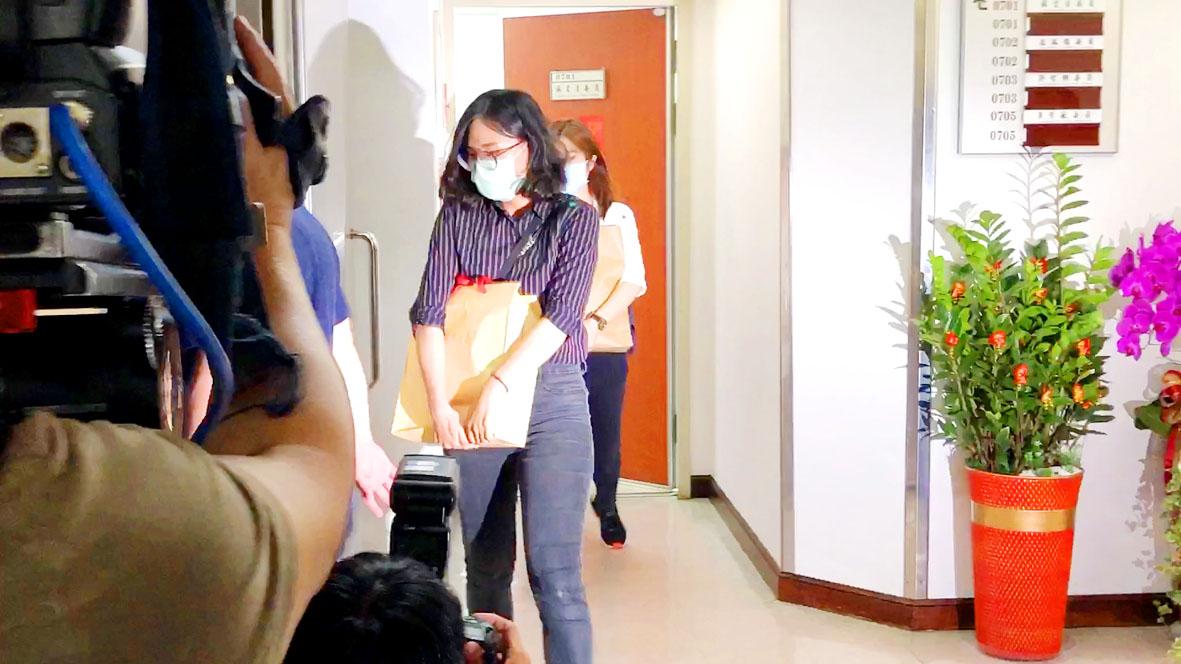Investigators yesterday searched the offices and homes of six current and former lawmakers, in connection with a corruption probe over allegations of taking bribes and other illegal activities arising from disputes in Far Eastern Group’s (遠東集團) takeover of Pacific Sogo Department Store (太平洋崇光百貨).
Chinese Nationalist Party (KMT) legislators Chen Chao-ming (陳超明), Sufin Siluko and Democratic Progressive Party (DPP) Legislator Su Chen-ching (蘇震清) were taken in for questioning at the Ministry of Justice’s Investigation Bureau office.

Photo: Chen Yun, Taipei Times
Also under investigation were independent legislator Chao Cheng-yu (趙正宇), former New Power Party legislator Hsu Yung-ming (徐永明) and former DPP lawmaker Mark Chen (陳唐山).
The massive operation, with raids at 65 locations, involved 230 judicial investigators and bureau officers, coordinated by 34 prosecutors, who had search warrants and summonses to question 63 people and seize documents.
Former Pacific Distribution Investment Co (太平洋流通) chairman Lee Heng-lung (李恆隆) and Knowledge International Consultancy (是知管理顧問公司) general manager and political lobbyist Kuo Ke-ming (郭克銘) are reportedly at the center of the investigation, as they allegedly passed bribes to the six lawmakers, with up to NT$20 million (US$677,920) allegedly changing hands.
Investigators have also reportedly uncovered NT$9.2 million in cash, allegedly received as bribes at one of legislator’s homes.
Lee since 2002 had been embroiled in a long-running dispute with Far Eastern Group chairman Douglas Hsu (徐旭東) over ownership of Pacific Sogo.
Taipei prosecutors in 2006 indicted Lee, Hsu and others for forgery and breach of trust related to their roles in dealings with Pacific Sogo.
The corruption probe centered on efforts to amend Article 9 of the Company Act (公司法), deliberated in the Legislative Finance Committee. The amendments addressed penalties associated with withdrawing a company’s incorporation when its owner or persons with controlling shares are indicated on forgery or related charges, which would have allegedly benefited Lee’s efforts to take back control of the department store.
In July 2018, the bill passed its third reading in the legislature, with five of the six politicians under investigation alleged to have taken bribes from Lee in exchange for gaining their respective parties’ support to expedite approval of the amendments.
Kuo, who was previously chief of Su’s legislative office, allegedly acted on behalf of Lee in distributing money to the politicians.
Prosecutors also accused Kuo of working for proprietors of funeral services companies Chen Ming-han (陳明瀚) and Chung Ke-hsin (鍾克信) on development projects on land within Yangmingshan National Park (陽明山國家公園) in Taipei.
They said he allegedly gave bribes to Chao, and other unspecified lawmakers, to pressure government agencies for rezoning permits.

Right-wing political scientist Laura Fernandez on Sunday won Costa Rica’s presidential election by a landslide, after promising to crack down on rising violence linked to the cocaine trade. Fernandez’s nearest rival, economist Alvaro Ramos, conceded defeat as results showed the ruling party far exceeding the threshold of 40 percent needed to avoid a runoff. With 94 percent of polling stations counted, the political heir of outgoing Costa Rican President Rodrigo Chaves had captured 48.3 percent of the vote compared with Ramos’ 33.4 percent, the Supreme Electoral Tribunal said. As soon as the first results were announced, members of Fernandez’s Sovereign People’s Party

MORE RESPONSIBILITY: Draftees would be expected to fight alongside professional soldiers, likely requiring the transformation of some training brigades into combat units The armed forces are to start incorporating new conscripts into combined arms brigades this year to enhance combat readiness, the Executive Yuan’s latest policy report said. The new policy would affect Taiwanese men entering the military for their compulsory service, which was extended to one year under reforms by then-president Tsai Ing-wen (蔡英文) in 2022. The conscripts would be trained to operate machine guns, uncrewed aerial vehicles, anti-tank guided missile launchers and Stinger air defense systems, the report said, adding that the basic training would be lengthened to eight weeks. After basic training, conscripts would be sorted into infantry battalions that would take

GROWING AMBITIONS: The scale and tempo of the operations show that the Strait has become the core theater for China to expand its security interests, the report said Chinese military aircraft incursions around Taiwan have surged nearly 15-fold over the past five years, according to a report released yesterday by the Democratic Progressive Party’s (DPP) Department of China Affairs. Sorties in the Taiwan Strait were previously irregular, totaling 380 in 2020, but have since evolved into routine operations, the report showed. “This demonstrates that the Taiwan Strait has become both the starting point and testing ground for Beijing’s expansionist ambitions,” it said. Driven by military expansionism, China is systematically pursuing actions aimed at altering the regional “status quo,” the department said, adding that Taiwan represents the most critical link in China’s

‘REALLY PROUD’: Nvidia would not be possible without Taiwan, Huang said, adding that TSMC would be increasing its capacity by 100 percent Nvidia Corp CEO Jensen Huang (黃仁勳) on Saturday praised and lightly cajoled his major Taiwanese suppliers to produce more to help power strong demand for artificial intelligence (AI), capping a visit to the country of his birth, where he has been mobbed by adoring fans at every step. Speaking at an impromptu press conference in the rain outside a Taipei restaurant, where he had hosted suppliers for a “trillion-dollar dinner,” named after the market capitalization of those firms attending, Huang said this would be another good year for business. “TSMC needs to work very hard this year because I need a lot